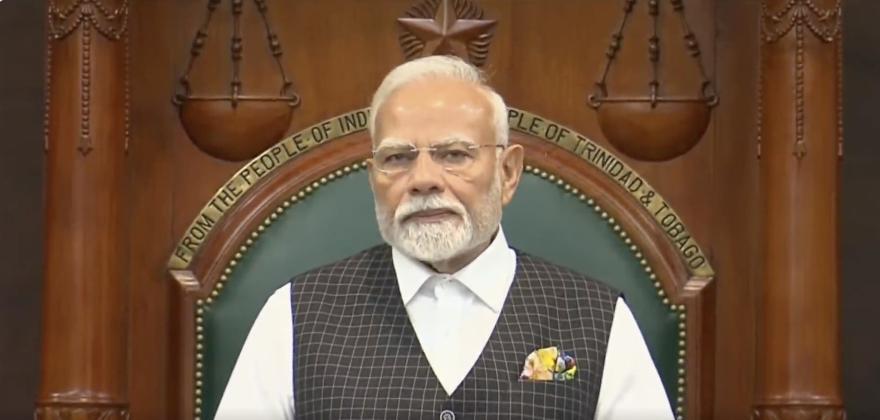
Glad to see so many women MPs: PM in Trinidad & Tobago parliament
Prime Minister Narendra Modi’s recent address to the joint assembly of Trinidad and Tobago’s parliament was a significant moment in the history of diplomatic relations between the two nations. During his speech, Modi expressed his delight at seeing a large number of women members of parliament, highlighting the importance of women’s empowerment in Indian culture. In this blog post, we will delve into the significance of Modi’s statement and the role of women in shaping India’s future.
Modi’s speech was a testament to the growing recognition of women’s contributions to society. In recent years, there has been a surge in the number of women entering politics, business, and other traditionally male-dominated fields. This trend is not limited to India alone; women are making their presence felt globally, breaking barriers and challenging stereotypes.
Modi’s statement about the importance of respect for women is deeply rooted in Indian culture. In Hinduism, the goddess Lakshmi is revered as the embodiment of prosperity and good fortune, while Durga is worshipped as a powerful symbol of feminine strength. The concept of Ardhanarishvara, which represents the union of male and female energies, is also deeply ingrained in Indian philosophy.
In modern India, women have made significant strides in various fields. From politics to business, education to entertainment, women are leading the charge in shaping the country’s future. The growing number of women in parliament is a testament to this trend. According to the Lok Sabha Secretariat, the number of women MPs in the 17th Lok Sabha has increased to 78, accounting for 14.2% of the total strength.
Modi’s statement is significant not only because of the growing number of women in parliament but also because of the role they are playing in shaping policy and legislation. Women MPs are bringing a unique perspective to the table, often focusing on issues that affect women and marginalized communities. From education to healthcare, women are playing a crucial role in addressing some of the most pressing challenges facing the country.
One of the most significant areas where women are making a difference is in the field of education. According to the Ministry of Human Resource Development, girls’ enrollment in primary education has increased by 6.5% since 2015. Similarly, the number of women pursuing higher education has also increased, with 46.6% of all students enrolled in higher education being women.
Women are also playing a crucial role in the healthcare sector. According to the World Health Organization, India has made significant progress in reducing maternal mortality rates. In 2017, the maternal mortality rate in India was 130 deaths per 100,000 live births, down from 211 deaths per 100,000 live births in 2005.
In business, women are also making a mark. According to a report by the International Finance Corporation, women-owned businesses in India are growing at a rate of 20% per annum, outpacing the national average. Women are also increasingly taking on leadership roles in corporations, with many companies recognizing the value of diversity and inclusion.
Modi’s statement is a recognition of the important role women are playing in shaping India’s future. As the country continues to grow and develop, it is essential that women are given the opportunities and support they need to succeed. By empowering women, India can build a stronger, more prosperous future for all its citizens.
In conclusion, Modi’s statement about the importance of respect for women is a welcome recognition of the significant contributions women are making to Indian society. As women continue to break barriers and challenge stereotypes, it is essential that we recognize and support their efforts. By doing so, India can build a brighter, more inclusive future for all its citizens.



